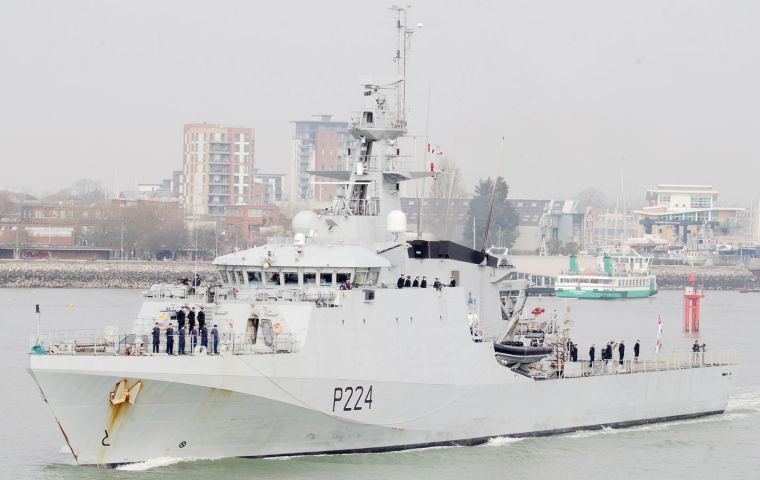MercoPress. South Atlantic News Agency
UK says Venezuela's military maneuvers “unjustified”
 The UK sent the HMS Trent in support of its former colony “for a series of routine engagements in the region”
The UK sent the HMS Trent in support of its former colony “for a series of routine engagements in the region” The United Kingdom said Venezuelan President Nicolàs Maduro's decision to up his country's military readiness over the Essequibo dispute with Guyana was “unjustified.” The Bolivarian forces deployed over 5,000 troops in response to the arrival in the area of the Royal Navy's HMS Trent.
The British authorities insisted Venezuela's actions were unjustified “and should cease” while negotiations were underway with several partners in the region “to avoid an escalation.”
The UK sent the HMS Trent in support of its former colony “for a series of routine engagements in the region” after the Dec. 3 referendum whereby Venezuela decided to annex the oil-rich territory.
“The border between the two countries was established in 1899 by international arbitration and we continue to support the territorial integrity of Guyana, an important regional ally and partner in the Commonwealth,” the UK stressed.
Earlier this month, Maduro and his Guyanese colleague Irfaan Ali met in St Vincent and the Grenadines at the invitation of Prime Minister Ralph Gonsalves who is also the pro tempore president of the Community of Latin American and Caribbean States (Celac). The encounter resulted in the so-called Argyle Declaration, whereby both leaders pledged not to use force to solve the controversy.
Also instrumental in these negotiations were interlocutors such as Caricom and Brazil. The South American country Friday called on both parties “to restrain themselves, return to dialogue, and respect the spirit and letter of the Argyle Declaration.”
“The Brazilian government believes that military manifestations in support of any of the parties should be avoided, so that the ongoing process of dialogue may yield results,” a statement from the Planalto Palace also read in implicit reference to the Trent's deployment. President Luiz Inácio Lula da Silva's administration is following “with concern the latest developments in the conflict around the Essequibo region.”
“Brazil considers the 'Argyle Declaration for Dialogue and Peace', signed by Guyana and Venezuela on December 14, under the auspices of Celac and Caricom, a milestone in the efforts to peacefully address the issue, bearing in mind the spirit of integration that moves us as a region of peace, cooperation, and solidarity,” the statement also noted.
Brasilia also insisted it was “convinced that regional institutions such as Celac and Caricom are the appropriate forums for the treatment of the issue.”




Top Comments
Disclaimer & comment rulesCommenting for this story is now closed.
If you have a Facebook account, become a fan and comment on our Facebook Page!